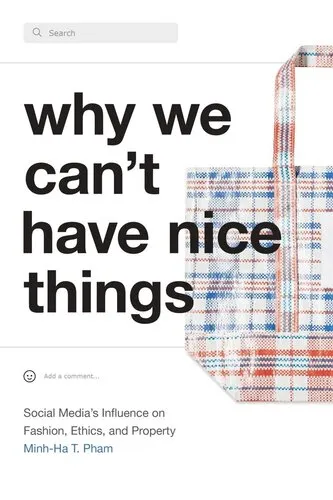Why We Can't Have Nice Things: Social Media’s Influence on Fashion, Ethics, and Property
4.5
Reviews from our users

You Can Ask your questions from this book's AI after Login
Each download or ask from book AI costs 2 points. To earn more free points, please visit the Points Guide Page and complete some valuable actions.Introduction to "Why We Can't Have Nice Things: Social Media’s Influence on Fashion, Ethics, and Property"
"Why We Can't Have Nice Things" by Minh-Ha T. Pham examines the profound impact of social media on the realms of fashion, ethics, and intellectual property. The book dives into the tensions between creativity and capitalism, the influence of digital platforms on cultural production, and the systemic inequities that shape the global fashion economy. Grounded in critical analysis and real-world examples, Pham presents a compelling case for why the internet’s democratizing potential is far more complicated than it seems.
The title itself is a playful yet pointed critique of the mechanisms by which digital media platforms, consumer capitalism, and legal frameworks work together to perpetuate issues like cultural appropriation, fast fashion, and exploitation. For readers interested in the intersection of fashion studies, digital culture, and ethics, this book provides an essential roadmap to understanding the contemporary issues surrounding intellectual property within creative industries.
Detailed Summary of the Book
Minh-Ha T. Pham’s book navigates through several interwoven themes that define the landscape of fashion in a social-media-dominated era. Pham begins by unpacking how platforms like Instagram and TikTok have created a new arena for fashion creativity but also reinforced systemic inequalities. The book highlights how smaller creators often find their designs appropriated by big brands, and how the lack of enforcement of intellectual property rights disproportionately affects marginalized communities and independent designers.
The author connects these issues to larger trends in fast fashion, where the culture of speed and disposability is magnified by social media’s rapid cycle of trends. Pham critiques the ethical shortcomings of the fashion industry, including unjust labor practices and environmental damage, offering deep insight into how digital consumerism perpetuates these dynamics. She carefully dissects the ways legal systems overlook or exacerbate these problems, ultimately raising questions about who truly benefits from the existing frameworks of property and ownership in fashion.
Key Takeaways
- Social media can amplify both opportunity and inequality in the world of fashion design and production.
- Cultural appropriation in fashion has been exacerbated by the ease of access and visibility enabled by digital platforms.
- Global labor inequities are deeply tied to fast fashion, which is fueled by the internet’s obsession with trends and constant consumption.
- The concept of intellectual property in fashion is highly contentious, as it often leaves smaller creators unprotected while favoring larger corporations.
- Ethical consumption in fashion requires systemic changes that go beyond individual actions.
Famous Quotes from the Book
"Social media promised to democratize fashion, but it often ends up consolidating power in the hands of those who already have it."
"The value of 'originality' becomes meaningless in a world where the speed of copying outpaces the speed of recognition."
"Ethical consumption is not about individual purity; it’s about collective accountability both online and offline."
Why This Book Matters
"Why We Can't Have Nice Things" provides a critical lens on the intersecting worlds of fashion, social media, and capitalist exploitation. This work is not just timely, but necessary, in an age where digital platforms shape consumer behavior, economic practices, and cultural narratives. Minh-Ha T. Pham expertly elucidates complex phenomena, making them accessible to both scholars and general readers alike. The book encourages a rethinking of what it means to consume and create ethically in an interconnected digital world.
More broadly, this book calls on readers to confront uncomfortable truths about the role of technology in perpetuating inequities, challenging us to imagine more equitable and sustainable systems. Its relevance extends beyond fashion into the broader realm of intellectual property and cultural production, making it an indispensable resource for anyone interested in these critical issues.
Free Direct Download
Get Free Access to Download this and other Thousands of Books (Join Now)
For read this book you need PDF Reader Software like Foxit Reader
Accessing books through legal platforms and public libraries not only supports the rights of authors and publishers but also contributes to the sustainability of reading culture. Before downloading, please take a moment to consider these options.
Find this book on other platforms:
WorldCat helps you find books in libraries worldwide.
See ratings, reviews, and discussions on Goodreads.
Find and buy rare or used books on AbeBooks.


